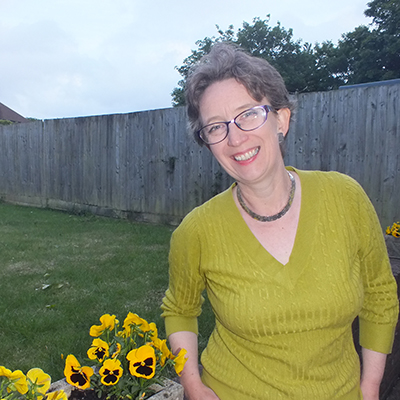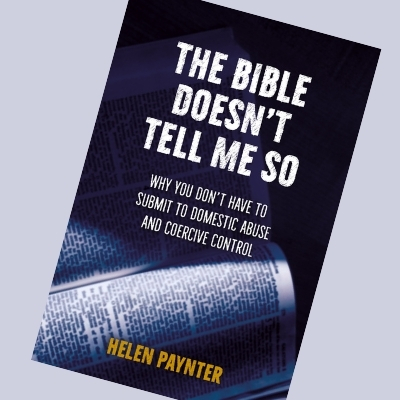Just two months into lockdown, evidence of a significant increase in domestic abuse emerged around the world. On 12 May we posted an article highlighting this disturbing development and offering a free sample chapter from Helen Paynter’s new book The Bible Doesn’t Tell Me So: Why you don’t have to submit to domestic abuse and coercive control. Addressing aspects of domestic abuse and coercive control that can take on a particular form in Christian communities, this important new book will be published next month. It is directed specifically to Christian individuals, church leaders and congregations. In this interview, Helen explains why she wrote the book, who she wrote it for and what she hopes it will achieve
How did the idea for the book come about?
I had become interested in how the Bible is used for the purposes of violence. Because of some speaking I’d been doing about sexual violence in the Old Testament, someone heard me and emailed me with a lot of questions.
She had a dreadful story. She’d been married for decades to a lay preacher in a major denomination, and for the entirety of her marriage he had exercised coercive control against her and gradually that control had got worse and worse until it included physical violence and rape. He had told her all along that the Bible said this was fine. He used the Bible in all sorts of ways to abuse her, telling her that it said this was what an ideal wife should be like and so on. He had weaponised the Bible against her.
‘He exercised coercive control against her that gradually got worse and worse until it included physical violence and rape.’
I answered her questions as best I could, but I never really expected to hear back from her. In fact, she wrote back very quickly and said, ‘Thank you so much for explaining all that – I wish I’d known that before.’
‘If only someone had sat down with her 20 years before and shown her how these texts should be interpreted.’
And that broke my heart – because if only someone had sat down with her 20 years before and shown her how these texts should be interpreted, maybe she could have been saved so much suffering. So that was what triggered the book – and I wrote it with her in my mind. I thought, ‘This is for you 20 years ago, and for anybody else like you, in a similar situation.’
How does that happen? What are the mechanisms that enable the Bible to be twisted to condone or even exacerbate abuse?
There’s a whole complex set of reasons. One is that the Bible carries great authority. What this means is that the person who interprets the Bible has a lot of power.
A second reason is that the Bible itself was written in a patriarchal age, so it makes some assumptions that need to be interpreted within the context in which it was written. If we fail to do that – if we fail to listen to those stories, rules or pieces of advice in their proper context – and try to drag and drop them into the 21st century, we fail to interpret them properly and end up misapplying scripture.
‘If we fail to listen to those stories in their proper context, we end up misapplying scripture.’
And a third reason is that until recently the world has been – and largely still is – enormously patriarchal, enormously controlled by men.
That network of elements can give you an extremely toxic combination which leads to the misuse of scripture.
I genuinely believe this is a misuse of scripture: it’s not me saying let’s come up with a new interpretation for a new generation. What I’m saying is let’s go back and try to understand what the text is really saying and how it was genuinely liberating in its own day and still is today.
Who are you writing for?
The person I had in mind when I was writing it was the woman who first emailed me, and everyone else like her – women who are experiencing the weaponisation of the Bible in their homes. I do know, of course, that domestic abuse happens in female-on-male situations and in non-heterosexual relationships, but when the Bible is being weaponised, my research shows that it is happening in largely married heterosexual relationships.
More widely, I also wrote it for those who seek to support such women, who want to help them work out whether they’re going to leave or whether they’re going to stay, and I wrote for people in churches – both congregations and ministers and leaders – to help them become more aware of how domestic abuse might be happening under their noses and how they might be inadvertently complicit in that.
Do you have any advice or insights to help concerned friends and family?
I think friends and family members need to inform themselves. Some of the things we might intuitively think about coercive control and domestic abuse are actually not correct. So, they should certainly read up about it. My book isn’t a guide to domestic abuse, it’s specifically about the abuse of the Bible.
Part of informing ourselves is learning what domestic abuse looks like and being alert to it. Sometimes it looks like a partner who seems very, very loving, and we think he’s lovely because he’s always got his arm round her in church or he always picks her up after Bible study. And that may be genuinely lovely, a genuinely close, affectionate relationship, but it could also a sign of someone who won’t let his wife out of his control. So we need to be alert to the signs. Abuse doesn’t always look like bruising.
‘Abuse doesn’t always look like bruising.’
Second, remember that one of the things that have happened to this woman is that she has had her autonomy systematically stripped away by her partner. So it doesn’t help to continue to disempower her – by going behind her back, by reporting things against her partner without her permission, and so on.
You also need to remember that the decision to leave an abusive partner needs to be planned extremely carefully. A woman is most at risk, most likely to be murdered, when she is leaving or just after she has left. So we shouldn’t be, by and large, putting a woman in our car and driving her away because that’s more likely to exacerbate the situation. We need to be helping her to plan carefully and thoughtfully, with the help of agencies who are experts in this.
Do you have anything specific to say to ministers and church leaders?
The first thing is please, please be aware that this happens in Christian homes; this happens in churches. The statistics suggest that it happens with just as much frequency in churches as it does in the general population.
The second thing is to please think hard about whether your church culture might be colluding with the abuser. I’m sure this is inadvertent, but in some church cultures I’ve heard the language of ‘grooming’ being used. I’ve heard women say they felt the church had ‘groomed’ them to accept abuse because the church told her about a woman’s place and that a woman should be subservient and meek and so on, and they felt that groomed them to accept the unacceptable.
And four specific pleas:
- Please believe someone if they say they are being abused. It may have taken her years to decide to disclose, and this may be the only time she will try it. When ministers don’t believe a woman who makes this claim – if they tell her she’s overreacting or may have misunderstood or if they insist on couples counselling – untold damage can result.
- Please don’t tell the woman that she needs to forgive her partner and that that means accepting him back into her home.
- Please don’t tell her that it’s her sacred duty to suffer.
- Please don’t tell her that God hates divorce and that that means she can never leave an abusive partner. That is a misuse of scripture.
More generally, please think hard about whether they may be things in your church culture which may be helping to perpetuate these situations.
What are the key things you want people to take away from this interview, and from your book when it comes out in October?
For everyone – women experiencing abuse, their friends and families, and, indeed, the abusers – the thing I really want people to take away is the message that God does not support this abuse.
What the abuser is doing is abominable in God’s sight. God is on the side of the weak and vulnerable and the abused. Please understand your worth and your value: you are not expected to put up with this.

Helen Paynter is director of the Centre for the Study of Bible and Violence. A Baptist minister and biblical specialist, she has published at popular and scholarly levels, including God of Violence Yesterday, God of Love Today? (2019) for BRF; she is also editor of BRF’s Guidelines Bible reading notes. She speaks nationally and internationally about the interpretation of biblical violence and the abuse of the Bible to promote violence.

The Bible Doesn't Tell Me So
Publishing 23 October
This book is addressed directly to women experiencing domestic abuse, and to those who seek to support them, including pastoral leaders, friends and support organisations.
It debunks the myths – perpetuated by some abusers and, unwittingly, by many churches – which prevent women from getting out of harm’s way. It helps them realise that the Bible does not belong to their abuser but is a text of liberation. Written with careful attention to pastoral issues, it closely examines and clearly explains the relevant scriptural texts.
